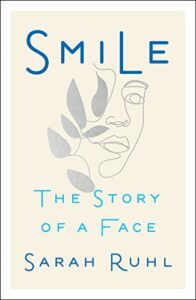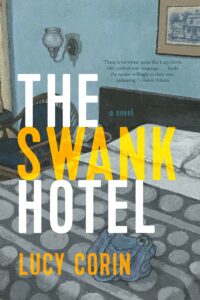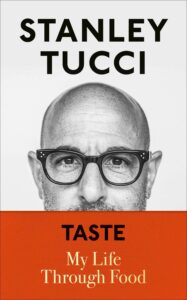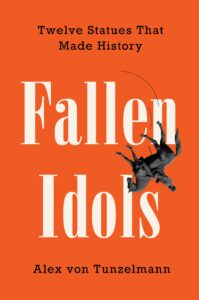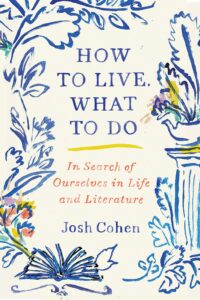
Lit Hub’s Most Anticipated Books of 2021, Part Two
222 Books We Want to Read Before 2022
OCTOBER
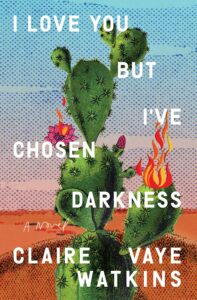
Claire Vaye Watkins, I Love You But I’ve Chosen Darkness
Riverhead, October 5
A strong candidate for the best book title of 2021, I Love You But I’ve Chosen Darkness is a darkly comic novel about a woman who leaves behind her husband and baby to step back into the mire of her past. A temporary reprieve from the stresses of new motherhood becomes an extended stay in the Mojave Desert, where the ghosts of her previous life await. Battleborn remains, to my mind, one of the finest short story collections of the 21st century, and Gold Fame Citrus was a hypnotically beautiful and terrifying work of dystopian fiction, so my hopes are sky high for this new one. –DS
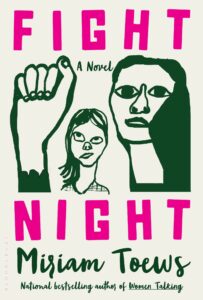
Miriam Toews, Fight Night
Bloomsbury, October 5
“Dear Dad, How are you? I was expelled.” So begins the latest novel from the author of Women Talking and All My Puny Sorrows, which will soon unspool into a relentlessly entertaining novel about three generations of women living under one roof, most of it rambunctiously reported by Swiv. While you will find Toews’ trademark themes of survival and community here, this novel is an absurdist comedy that will make you giggle into your soup. –ET
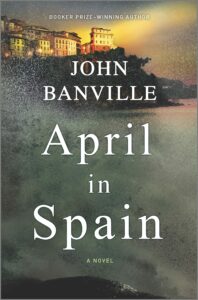
John Banville, April in Spain
Hanover Square, October 5
April in Spain, Banville’s new addition to his Detective Strafford crime series, begins with the pathologist Quirke in San Sebastian, Spain, as he makes a startling discovery: that a woman thought to be murdered long ago may still be alive. After alerting Detective St. John Strafford, Quirke finds himself unexpectedly entangled in the story of her disappearance. The novel promises to be a compelling addition to Banville’s extensive body of work. –CS
Sarah Ruhl, Smile: The Story of a Face
Simon & Schuster, October 5
Playwright and literal (MacArthur) genius Sarah Ruhl suffered Bell’s palsy after delivering twins, completely paralyzing the left side of her face. While doctors assured her that 90 percent of patients have a full recovery, Ruhl was in the ten percent. Her face became asymmetrical: she was unable to close her left eye, she worried about conveying love to her young children, and when paparazzi shout “Smile!” at her on the red carpet for her play’s Broadway premiere, she can’t. Smile is very much “the story of a face” and an exploration of how we communicate our interior feelings to the outside world. As a patient, a mother, and an artist, Ruhl unpacks the intentions of the body, postpartum depression, spiritual life, and pain in a world that demands symmetry. –EF
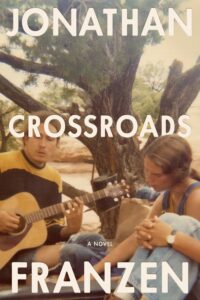
Jonathan Franzen, Crossroads
FSG, October 5
As you no doubt remember from seeing it on Twitter, Jonathan Franzen is “widely recognized as the leading novelist of his generation” and also “often described as a teller of family stories.” Whatever you may feel about that first bit, there’s no arguing with the fact that Crossroads, the first in an expected trilogy entitled A Key to All Mythologies, is an in-depth portrait of the Hildebrandt family, each member of which is desperate for freedom in a different way—though for most it is at least tangentially related to Crossroads, the counterculture church group that is the site of the patriarch’s greatest shame. It’s a doorstop at 580 pages, but like most of Franzen’s novels, it goes down smooth. –ET

Amor Towles, The Lincoln Highway
Viking, October 5
The latest from the bestselling author of A Gentleman in Moscow and Rules of Civility is set over ten days in June of 1954, when eighteen-year-old Emmett Watson is released from a work camp where he’d spent a year for involuntary manslaughter. Having little to return home to, his plan is to head west—but he is soon surprised by two stowaways from the camp, who have other ideas. Epic road trip Americana! –ET

James Han Mattson, Reprieve
William Morrow, October 5
Quigley House is a full-contact haunted house, and four contestants will win a cash prize if they don’t shout the safe word “reprieve.” Spoiler! Before they can complete the challenge, someone breaks into the cell and kills one of the contestants. But as each character’s story unfolds and overlaps, revealing obsessions, prejudice, and secrets, Reprieve transforms from a classic horror story to a portrait—and social critique—of contemporary American life. –EF
Lucy Corin, The Swank Hotel
Graywolf, October 5
At long last, a new book from Lucy Corin, whose writing never fails to be uncanny and diamond sharp and deeply moving when you least expect it. Graywolf describes this novel, which is set during the 2008 financial crisis, as an “acrobatic, unforgettable, surreal, and unexpectedly comic novel that interrogates the illusory dream of stability that pervaded early twenty-first-century America.” Yep, sounds like Corin, and I can’t wait to get my hands on it. –ET
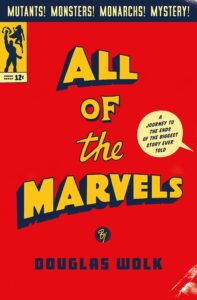
Douglas Wolk, All of the Marvels: A Journey to the Ends of the Biggest Story Ever Told
Penguin Press, October 5
Yes, yes, I’m a nerd. (Not only am I actively excited about this book coming out about the extended Marvel Universe, but I admittedly chortled with glee at the title’s pun.) And even though Sally Rooney says we’re not supposed to like superhero movies, there is always a special place in my heart for Marvel stories. The totally unique and amazing thing about comic book characters is that they stand on the shoulders of all the writers who have had a hand in crafting their stories. (Like, say, Ta-Nehisi Coates penning Captain America.) They are a new kind of oral history. They change with our times. And now Douglas Wolk has given himself the seemingly impossible task of reading all 27,000 comics and reflecting on this very specific microcosm of our culture. –KY
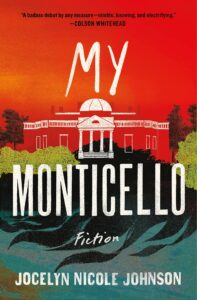
Jocelyn Nicole Johnson, My Monticello
Henry Holt, October 5
If you don’t know, Monticello is Thomas Jefferson’s famous home and plantation, set on a hill in Charlottesville, Virginia. Considering that Jefferson enslaved over 600 people in his life, including Sally Hemings, who bore his children, it’s something of a fraught landmark. In the title novella of Johnson’s debut collection, Charlottesville is attacked by a white supremacist mob (um, again) and a group of citizens, including a young descendant of Hemings and Jefferson, take refuge in Monticello and try to rebuild there. This is poised to be one of the breakout debuts of the season. –ET
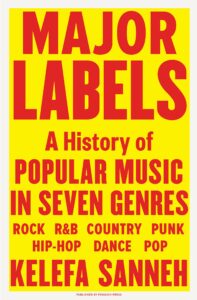
Kelefa Sanneh, Major Labels: A History of Popular Music in Seven Genres
Penguin Press, October 5
Kelefa Sanneh takes a very ambitious swing with this deep dive into a half century of American music, seeking to trace the evolution of popular music across seven genres: rock, R&B, country, punk, hip-hop, punk, dance music, and pop. As both an engine of commerce and the driving force behind myriad cultural shifts, popular music has shaped American society in ways we can only begin understand. But it would be hard to find a better guide than Sanneh to help us try. –JD
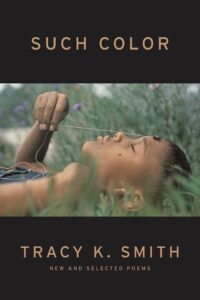
Tracy K. Smith, Such Color
Graywolf, October 5
I had the chance to meet Tracy K. Smith during a reading and book signing for 2018’s Wade in the Water. It was such a pleasure to hear Smith, who served as the 22nd Poet Laureate of the United States from 2017 to 2019, share the origin of that collection and her research process. This latest volume features new and selected poems, offering a sweeping overview of Smith’s illustrious career thus far. –VW
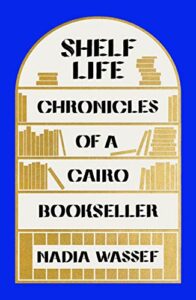
Nadia Wassef, Shelf Life: Chronicles of a Cairo Bookseller
FSG, October 5
The gripping story of three women who, against all odds, opened a successful independent bookstore in Cairo? Nadia Wassef’s memoir of the founding of Diwan—a store which now has ten locations and 150 employees—is very much for readers of Lit Hub. –JD
Stanley Tucci, Taste: My Life Through Food
Gallery Books, October 5
In the beloved Julie & Julia, Stanley Tucci plays the doting husband of Meryl Streep’s Julia Child. There’s this one scene where he’s proposing a toast. They’re hosting a Valentine’s Day dinner, and everyone’s got giant red felt hearts pinned to their shirts. Stanley Tucci stands and says, “Julia, you are the butter to my bread, and the breath to my life.” In his real life, the actor is also an avid foodie and the author of two cookbooks. Taste: My Life Through Food gets a touch more personal. In this new book, Stanley Tucci gives us, to quote the film, the “breath to my life” part of his obsession. There are anecdotes about growing up in Westchester and falling in love with his wife, told with his signature charm. Taste is a love letter to food—and the people who sit beside us at the dinner table. –KY
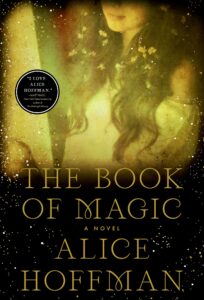
Alice Hoffman, The Book of Magic
Simon & Schuster, October 5
This fall, the Practical Magic series comes to a close. It’s time to say a fond farewell to the Owens women—but not without one final adventure and revelations of a few more family secrets. You, dear reader of this site and likely fellow Practical Magic fanatic, obviously already know that the crux of this cult classic is that the Owens family has a curse on them. Several generations ago, a woman named Maria Owens was spurned by a lover and cast a spell on herself to ward off heartbreak. As her bitterness grew, the spell transformed into a generations-long curse, ensuring that any man who falls in love with an Owens woman will die at the hands of the deathwatch beetle. At long last, in The Book of Magic, three generations travel to their ancestral land to try to break the spell. Alice Hoffman has given us such a gift with this series, and this final chapter is sure to be another heartfelt celebration of mothers and daughters and the magic of falling in love. –KY
Anne Carson, H of H Playbook
New Directions, October 5
Fans of Anne Carson, rejoice! From the iconic poet who penned Autobiography of Red comes a new retelling. In H of H Playbook, she tackles Herakles, Euripides’s Greek tragedy about that most famous of demigods who comes home from war and cannot adjust to civilian life: he goes mad, kills his family, and plans to commit suicide. His friend Theseus steps in and tries to show him that he is not beyond redemption and that his life is not without meaning. Anne Caron’s depth of knowledge about Greek mythology coupled with her poetic sensibility and illustrations is sure to breathe new life into this oft-told story. –KY
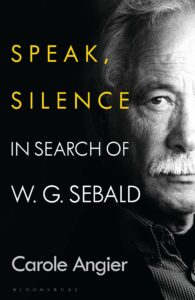
Carole Angier, Speak, Silence: In Search of W. G. Sebald
Bloomsbury, October 5
I can’t believe it’s taken this long for someone to publish a biography of W.G. Sebald, and I have high hopes for this work by Angier, who has previously written well-received biographies of Jean Rhys and Primo Levi, which her publisher describes as a “unique, ferociously original portrait that pushes the boundaries of biography just as its subject pushed the boundaries of fiction.” Digging the Nabokov reference, too. –ET
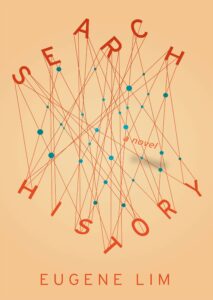
Eugene Lim, Search History
Coffee House, October 5
Eugene Lim’s fourth novel starts with a mourning friend deciding their dead friend Frank has been reincarnated as a dog. After that, it’s off to the races as an ensemble cast of both friends and enemies searches for dog-Frank. Search History is an absurdist depiction of the grieving process and the narratives we tell ourselves—and apparently there are lengthy digressions about AI-generated fiction and representation in the arts? I’m in. –WC
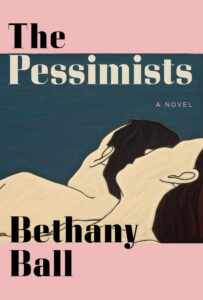
Bethany Ball, The Pessimists
Grove, October 12
One of America’s greatest contributions to world literature is the deeply entertaining, often debilitatingly sad genre of “shiny suburban facades hiding deep, dark secrets”—and with her second novel, Bethany Ball is proving herself a burgeoning master of the form. Set in a rich Connecticut town that seemingly revolves around an exclusive private school, The Pessimists plumbs the depths of unearned privilege and the moral entitlement it engenders: marriages fail, lives go sideways, and no one finds the happiness they think they deserve. –JD
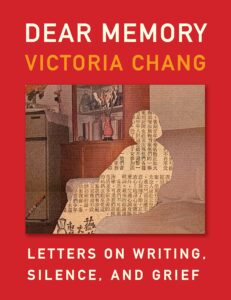
Victoria Chang, Dear Memory: Letters on Writing, Silence, and Grief
Milkweed, October 12
Poet Victoria Chang’s (incredible) Obit re-envisioned the form of the newspaper obituary to confront her many experiences of grief at her mother’s death. Now, Chang has assembled a collection of letters to family, past teachers, and fellow poets, as well as family memorabilia, creating not just a moving family history but a rumination on the creative and self-shaping act of remembering. –WC
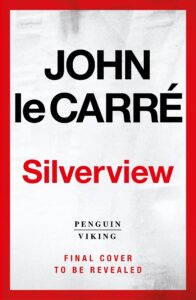
John le Carré, Silverview
Viking, October 12
The final novel by the late espionage fiction titan—finished just before his death in December of last year—follows a bookseller in a small English seaside town who becomes embroiled in a spy leak when a mysterious Polish émigré suddenly enters, and upends, his quiet coastal life. Described as a “mesmerizing story of an encounter between innocence and experience and between public duty and private morals,” le Carré’s swan song sounds like another deft and compelling evocation of the morally murky world of the Secret Intelligence Service. –DS

Jeanette Winterson, 12 Bytes: How We Got Here. Where We Might Go Next
Grove, October 12
Jeanette Winterson has always been lightyears ahead of everybody else. She embraces newness in the service of her stories. She has this incredible ability to take in threads of information and spin them into the tales she most wants to tell. I would argue that she actually wrote the first Internet novel over two decades ago. Her most recent novel, Frankissstein, is about the night Mary Shelley brought Frankenstein to life… and AI sex dolls. Honestly, I’m convinced that Jeanette Winterson doesn’t experience time in the same way that everybody else does because she can so seamlessly bring together ancient myth and modern-day technology. With her new book, she delves into the nonfiction side of this story, lending us her observant eye and agile mind. In 12 Bytes, she offers us a dozen smart and inventive essays on artificial intelligence, how it shapes love, and the way it can encroach on our lives. (For the record, autocorrect did attempt to make that “enrich our lives.”) –KY
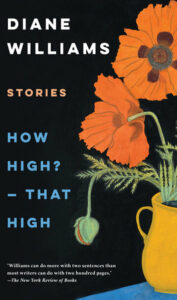
Diane Williams, How High? — That High
Soho Press, October 12
Williams, the founder and editor of the literary annual, NOON, presents a short story collection that promises to capture the spectrum of the human condition. If you peek at the book’s Goodreads page (I know, I know, we all hate Goodreads!), you’ll see that Jenny Lawson called it “strange and experimental” and “like translating poems from a language you don’t entirely know yet.” Call me intrigued! –VW

Donald Antrim, One Friday in April
W. W. Norton, October 12
In which the wonderful surrealist novelist and memoirist Donald Antrim tells the story of his battles with serious depression, and his suicidal thoughts, and argues for not only a re-romanticization of suicide, but a different framing—of suicide and suicidal ideation as an illness as opposed to merely an outcome—altogether. –ET

Susan Orlean, On Animals
Avid Reader, October 12
Susan Orlean’s delightful, drunken Twitter rant got us through one of the darkest weeks of Summer 2020, and this fall she’s bringing us a collection about the ways we live with animals—from household pets to those that end up on (your) plates. We meet a whale in Iceland who refuses to be free, a New Jersey woman with 23 pet tigers, snow dogs, and pigeons—each story told with Orlean’s careful research and extreme empathy, and the New Yorker pacing that makes each story feel profound, delightful, and like you’ve learned something brilliant to share at your next dinner party. –EF
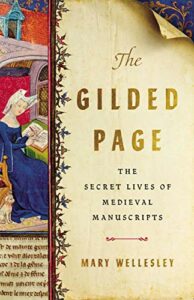
Mary Wellesley, The Gilded Page: The Secret Lives of Medieval Manuscripts
Basic Books, October 12
Did you know that Chaucer’s status as a government official was a significant factor in the survival of his manuscripts? Sure, he was talented, and The Canterbury Tales were a rip-roaring good time, but the longevity of illuminated manuscripts had as much to do with their material origins as with their quality (it also helped if one’s descendants had the wherewithal for proper storage). Mary Wellesley’s deep-dive into the production side of ancient texts sheds light on all the unheralded work behind the creation and preservation of some of the world’s finest book objects, from the binders and grinder to the lowly scribes who actually “wrote” the damn things. –JD
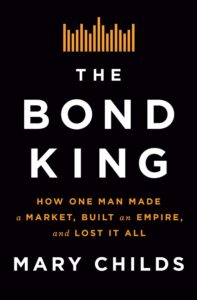
Mary Childs, The Bond King: How One Man Made a Market, Built an Empire, and Lost It All
Flatiron, October 12
I’m both disgusted and fascinated by the lives and times of billionaires, and there’s no one better than a Planet Money reporter to tell the story of the rise and (relative) fall of financial whiz kid Bill Gross in a way that’s compelling and legible even to someone as ignorant of all things stock and/or bond as I am. (Mary Childs explained NFTs to me, AMA. Actually, no. Ask her.) We should all be more aware of the horrifying impact of shadowy finance figures on our lives, and this book is a great place to start. –JG

Tamara Shopsin, LaserWriter II
MCD, October 12
Look, you either love the idea of a coming of age novel set in Tekserve (written by an honest-to-goodness ex-Tek), or you have no idea what I’m talking about and also probably don’t need eye cream yet. Either way, Tamara Shopsin is always worth a read. –ET
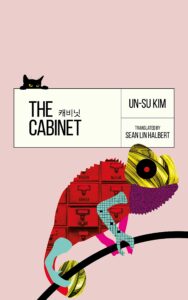
Un-Su Kim, tr. Sean Lin Halbert, The Cabinet
Angry Robot, October 12
I loved Un-Su Kim’s irreverent thriller The Plotters, which was published in English in 2019, so I was excited to learn that his very first novel is about to get the same treatment. The Cabinet concerns, well, a filing cabinet filled with the weirdest symptoms and tendencies that mankind has to offer; it won the Munhakdongne Novel Award, South Korea’s most prestigious literary prize when it was first published in 2006. –ET
Edith Wharton, Ghosts
NYRB, October 12
Edith Wharton: astute chronicler of socialites, popular expert on interior decoration, dog obsessive, master of the ghost story. In this, the spookiest month, NYRB is reissuing Wharton’s collection of eleven ghost stories, which she assembled shortly before her death in 1937. “It would be tempting to dwell on what we shall lose when the wraith and the fetch are no more with us,” Wharton writes in the preface, “but my purpose here is rather to celebrate those who have made them visible to us. For the ghost should never be allowed to forget that his only chance of survival is in the tales of those who have encountered him, whether actually or imaginatively—and perhaps preferably the latter. It is luckier for a ghost to be vividly imagined than dully ‘experienced’; and nobody knows better than a ghost how hard it is to put him or her into words shadowy yet transparent enough.” Except, perhaps, Wharton herself. –ET
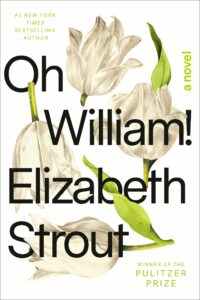
Elizabeth Strout, Oh William!
Random House, October 19
Elizabeth Strout excels at managing the balance of deep empathy and humor with no trace of sentimentality. I love spending time with her characters, and I love that she returns to them herself, unable to pull herself away from the inner lives she’s created. Such is the case with Oh William!, which features the Lucy Barton of a previous novel, returning herself to an ex-husband as he tries to uncover a family secret. –JG

Jane Goodall and Doug Abrams, The Book of Hope
Celadon, October 19
As a child of the ’80s, Jane Goodall is a Major Celebrity to me. And now the 87-year-old naturalist is back with advice on how I can feel hopeful despite, well, everything? That is soothing, folks. Sign me up. –ET
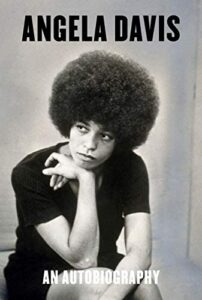
Angela Davis, Angela Davis: An Autobiography
Haymarket, October 19
One of the great activist autobiographies by one of this country’s greatest ever activists. First published and edited by Toni Morrison in 1974, An Autobiography (republished with a new introduction by the author) is an account of Davis’ incredible early years in the struggle: from her childhood on “Dynamite Hill” in Birmingham, Alabama, to her impassioned political activity in a New York high school; from her work with the US Communist Party and the Black Panther Party to her time on the faculty of the Philosophy Department at UCLA; from her visits with Fidel Castro to her appearance on the FBI’s Ten Most Wanted Fugitives list—and all before she was thirty years old. Davis is a living legend, one of the inspirational public figures of the last century, and this iconic portrait of the revolutionary as a young woman will remind you why. –DS
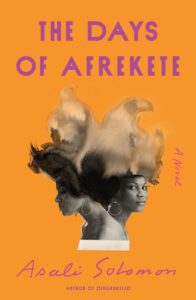
Asali Solomon, The Days of Afrekete
FSG, October 19
All I really needed to know to anticipate this one was that it was a novel about female friendship and women at midlife, inspired by both Mrs Dalloway and Sula, two of the best books ever written on any subject. But also, Liz Moore called it “a masterwork that shines a spotlight on what is troubling, uncomfortable, and hilariously funny about our present moment in time,” and wrote that it “seems at first like a blistering send-up of an upper-middle-class dinner party, expands into strangeness and beauty and a meditation on the meaning of life.” This is my kind of book, no matter how you slice it. –ET
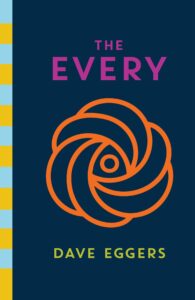
Dave Eggers, The Every
Knopf, October 19
Eggers takes his probing social criticism-via-the-novel approach to the all pervasive world of social media, as we follow the deeply tech-averse Delaney Wells’ attempt to take down the eponymous surveillance corporation from within. Extra plaudits to Eggers for making the difficult IRL decision to not sell his new book in hardcover on Amazon (it will be available only at independent bookstores). –JD
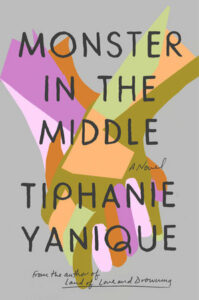
Tiphanie Yanique, Monster in the Middle
Riverhead, October 19
This novel by the author of 2014’s Land of Love and Drowning centers on a Black American man named Fly and a Catholic science teacher from the Caribbean named Stella. This love story spans decades and countries. Fly and Stella explore intimacy through a generational, historical and societal lens. As RuPaul famously (and wisely) said, “If you can’t love yourself, how in the hell you gonna love somebody else?” –VW
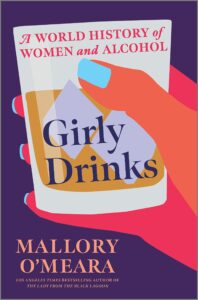
Mallory O’Meara, Girly Drinks: A World History of Women and Alcohol
Hanover Square Press, October 19
Mallory O’Meara, the LA-based author of the absolutely delightful 2019 Hollywood biography The Lady from The Black Lagoon: Hollywood Monsters and the Lost Legacy of Milicent Patrick, returns to the realm of historically overlooked women who did extremely cool shit with a feminist history of drinking through the ages. In Girly Drinks, O’Meara gives us with the untold history of the female distillers, brewers, and imbibers who played a crucial role in the evolution of alcohol as we know it today—from ancient Sumerian beer goddess Ninkasi to the iconic 1920s London bartender Ada Coleman. Booze History is one of my favorite historical sub categories, so I’ll be gulping this one down in the fall. –DS
Alex von Tunzelmann, Fallen Idols: Twelve Statues That Made History
Harper Book, October 19
The last few years has seen the world (well, the conquering, colonial world) confront its own might-makes-right approach to history, particularly in the way we commemorate it via statues of “great” men: never before in human history have so many people had strong opinions about statues. Enter Alex Von Tunzelmann and his engrossing history of twelve statues: why they went up, how they were seen, and, importantly, the reasons they came down. This book will help you win that fractious Thanksgiving argument with your crotchety uncle. –JD
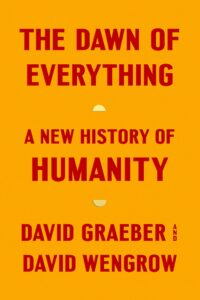
David Graeber, David Wengrow, The Dawn of Everything: A New History of Humanity
FSG, October 19
We recently lost anarchist-historian-anthropologist David Graeber far too early. A terrible thing, not least because his incisive, erudite histories of human nature are indeed more valuable to us now than ever, as we try to make sense of a world embroiled in questions about post-pandemic life and the ongoing depredations of global capitalism (to the human and natural worlds alike!). Graeber, writing here with David Wengrow, looks way back to the earliest forms of self-organization among human societies for clues as to how we might survive the coming decades. Seven-hundred pages you should definitely make time to read. –JD
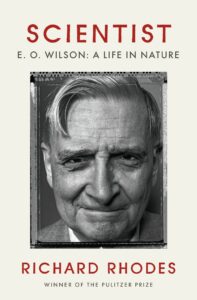
Richard Rhodes, Scientist: E. O. Wilson: A Life in Nature
Doubleday, October 19
Historian and author Richard Rhodes has written more than two dozen books on crucial moments and movements in American history—including, among his numerous books on nuclear power, the Pulitzer- and National Book Award-winning The Making of the Atomic Bomb (1986). Now, he looks at the life of legendary scientist E. O. Wilson, whose early interest in ant life led to a long, varied career as a leader in the biological sciences. Wilson’s life and substantial accomplishments—many have called him the “natural heir” to Darwin—are ripe topics for exploration, and particularly important as we continue to confront the climate crisis’ effects on biodiversity. –CS

Mark McGurl, Everything and Less: The Novel in the Age of Amazon
Verso, October 19
When we talk about the “Internet novel” we tend to mean a heady, almost manic narrative that mirrors our toxic and addictive relationship to social media. But what if the very means of distribution—overwhelmingly Amazon—is the thing that is changing most how we write novels? As Mark McGurl suggests in this deep dive into the ubiquitous reach of “the world’s biggest bookstore,” in the age of Amazon, “every novel is a genre novel.” Shudder. –JD
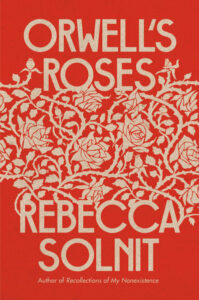
Rebecca Solnit, Orwell’s Roses
Viking, October 19
Did you know George Orwell was a gardener? I certainly did not. But apparently the great political theorist and observer had quite the green thumb. The fact that it was Rebecca Solnit who stumbled upon the roses he planted in 1936 (!) feels sort of perfect to me. The author of Men Explain Things to Me and A Field Guide to Getting Lost has a knack for making surprising and poignant connections between seemingly disparate things. Her latest is about the Orwelll’s love for the natural world and how it ran parallel to his dedication to antifascism. This is sure to be another expansive look at politics, power, beauty, and the stories we tell ourselves. –KY

Domenico Starnone, tr. Jhumpa Lahiri, Trust
Europa Editions, October 19
Italy’s inimitable Domenico Starnone (Ties, Trick) returns with Trust, a story with a setup that had me at hello: in a last-ditch attempt to save their relationship, Teresa decides that she and Pietro should share their most shameful secret with each other—something they’d otherwise never tell a soul. Then they break up. As they go on about their lives and Pietro falls in love with someone else, he can’t stop thinking about Teresa—or maybe, more pressingly, his confession. I suspect that the secret itself is a secondary concern to the couple’s story, but either way, I’m already dying of suspense. –ES
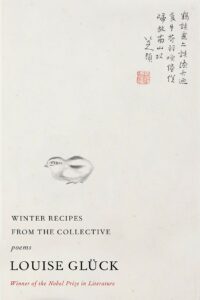
Louise Glück, Winter Recipes from the Collective
FSG, October 19
More than a decade before she won the Nobel Prize, Louise Glück declared she was never aiming for a particularly wide readership, telling The New York Times, “To the degree that I apprehend acclaim, I think, ‘Ah, it’s a flaw in the work.’” Her poems are challenging, filled with the intellectual wanderings and unexpected diversions that mark her unique approach to the most complex subjects of human life. She brings this inimitable poetic style to her thirteenth collection, which touches on mortality, grief, art, and other areas open to Glück’s poetic expression. –CS
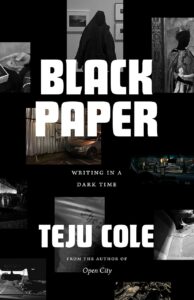
Teju Cole, Black Paper: Writing in a Dark Time
University of Chicago Press, October 22
This essay collection from Teju Cole seeks to consider “what it means to sustain our humanity—and witness the humanity of others—in a time of darkness.” Cole is a master at this form, and I’m sure this new work will explore Blackness and the nuances of Black identity with transformative wisdom. –VW
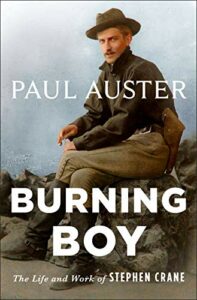
Paul Auster, Burning Boy: The Life and Work of Stephen Crane
Henry Holt, October 22
This action-packed biography tells the story of Red Badge of Courage author Stephen Crane, whose war reportage, journalism and fiction transformed American literature all before his death at twenty-eight. It’s a story of an extraordinary life, but also a reflection on Crane’s creative process—an analysis of one of the greats from another master of the craft. –WC
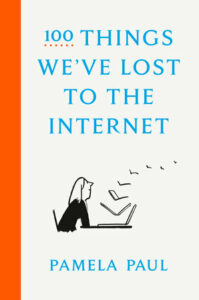
Pamela Paul, 100 Things We’ve Lost to the Internet
Crown, October 22
As someone who spends a vaguely nauseating amount of time on the internet, the feeling that tiny but essential bit of myself are being torn off me and sucked into its depths is constant. 100 Things We’ve Lost to the Internet is both ode and guide—an ode to what we’ve lost and a guide to reclaiming pieces of the analog world. It sounds like the perfect thing to read in hard copy. –JG
Josh Cohen, How to Live. What to Do: In Search of Ourselves in Life and Literature
Pantheon, October 22
Yes, yes, we tell stories in order to live, but we definitely also READ THEM in order to survive. Or so thinks psychoanalyst and literature professor Josh Cohen (not the novelist). In this wide-ranging, cradle-to-grave survey of beloved classics, ranging from Lewis Carroll to James Baldwin to Kazuo Ishiguro, Cohen makes the case for fiction as a crucial aid to introspection, suggesting that our ability to see ourselves in literary characters runs parallel to the all-important ability to see ourselves. –JD
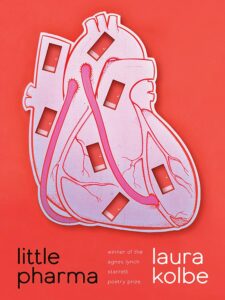
Laura Kolbe, Little Pharma
University of Pittsburgh Press, October 26
This first book of poems by writer, doctor, and medical ethicist Laura Kolbe is vital and urgent, tempered by wit and layered language. A lot of ground is covered in these poems—not only do we see the insides of hospitals, of doctor’s brains (“I am tired of playing / death’s white clerk // I will stand in the glove closet / eating an orange.”), of human bodies, but Kolbe evokes Lady Macbeth, Bill Traylor, Merle Haggard; this is a wry celebration of life in all its complex circuitry. –ET









